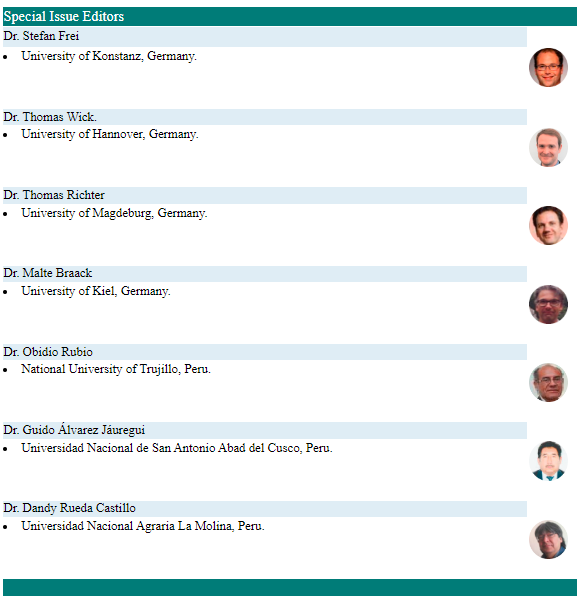Teaching strategies and academic performance of students; Faculty of Chemical and Textile Engineering - UNI
DOI:
https://doi.org/10.17268/sel.mat.2021.02.18Keywords:
Strategies, teaching, academic performanceAbstract
Objective: To know the level of association between the teaching strategies and the academic performance of the university students of the 4th year. cycle of the Faculty of Chemical and Textile Engineering (FIQT) of the National University of Engineering (UNI) considering the different subjects they are studying, corresponding to the year 2015. Materials and Method: It is a correlational study that considered as instruments a questionnaire and the report card to a sample of 100 students, whose data were processed in the SPSS program.
Results: When applying Spearman’s Rho, the correlation coefficient is Rho = 0,410, which indicates that there is a moderate significant correlation between academic performance and teaching strategies, they have an impact on the educational quality of 4th cycle students the FIQT of the UNI in the 2015-2 cycle. Similarly, it was found that the dimension of the teacher teaching strategies variable (methodological strategies, management of educational resources, teacher performance and training, and content to be taught) are related to the variable academic performance, evidenced in the following relationship levels: Rho = 0,372, Rho = 0,163, Rho = 0,380 and Rho = 0,464. Conclusion: The teaching strategies of the teacher do have a certain relationship in the academic performance of the students, although not in a high proportion; This may be due to the fact that UNI students are well prepared, since the selection process to enter the university is very competitive.
References
Abalde E, Barca A, Muñoz JM, Ziemer MF. Rendimiento académico y enfoques de aprendizaje: una aproximación a la realidad de la enseñanza superior brasileña en la región norte. Revista de Investigación Educativa. 2009; 27(2)303-3019.
Cevallos D. La Calidad Educativa en la realidad Universitaria Peruana frente al Contexto Latinoamericano. Revista de la Universidad Católica Santo Toribio de Mogrovejo, Chiclayo, Perú, 2014.
Córdoba L, García V, Luengo L, Vizuete M, Feu S. Determinantes socioculturales: su relación con el rendimiento académico en alumnos de Enseñanza Secundaria Obligatoria. Revista de Investigación Educativa, 2011; 29(1):83-96. https://revistas.um.es/rie/article/view/110361/126942
Cú G, Aragón F. El perfil sociodemográfico y su impacto en el rendimiento académico de los alumnos de la Universidad Autónoma de Campeche, México. Revista de Nuevas Tecnologías y Sociedad, 2006; 42. http://dialnet. unirioja.es/servlet/oaiart?codigo=1960003
Gómez M, Alzate M. La enseñanza y su relación con el saber en los estudiantes universitarios colombianos. Educacao e Pesquisa, 2010; 40(3):599-615. https://www.scielo.br/j/ep/a/gDdk5gkZ9p7NMMw8KbtSJPD/?format=pdf&lang=es
Jiménez J. Estrategias de enseñanza que promueven la mejora del rendimiento académico en estudiantes de medicina. Tesis doctoral, Universidad de Castilla La Mancha, 2013. https://ruidera.uclm.es/xmlui/bitstream/handle/10578/6331/TESIS%20Jim%C3%A9nez%20Coronas.pdf?sequence=1
Loret de Mola J. Estilos y estrategias de aprendizaje en el rendimiento académico de los estudiantes de la universidad peruana Los Andes de Huancayo –Perú. Revista Estilos de Aprendizaje, 2011; 8(4):149-185. http://revistaestilosdeaprendizaje.com/article/view/941/1649
Montero E, Villalobos J, Valverde A. Factores institucionales, pedagógicos, psicosociales y sociodemográficos asociados al rendimiento académico en la Universidad de Costa Rica: Un análisis multinivel. RELIEVE, 2007; 13(2):215-234.
Serón N. Relación que existe entre factores estresantes y rendimiento académico de los estudiantes de Enfermería de la UNMSM. Tesis de Licenciatura, Universidad Nacional Mayor de San Marcos, 2006.
Sierra R. Técnicas de Investigación Social. R. Editorial Paraninfo S.A. Magallanes 25, Madrid, España. 1994.
Tineo F. Factores del rendimiento académico y el aprendizaje de Química General I, en los estudiantes de la Universidad Nacional de Ingeniería, 2013. Tesis doctoral, Universidad Nacional de Educación Enrique Guzmán y Valle, 2015.
Downloads
Published
How to Cite
Issue
Section
License
Copyright (c) 2021 Selecciones Matemáticas

This work is licensed under a Creative Commons Attribution 4.0 International License.
The authors who publish in this journal accept the following conditions:
1. The authors retain the copyright and assign to the journal the right of the first publication, with the work registered with the Creative Commons Attribution License,Atribución 4.0 Internacional (CC BY 4.0) which allows third parties to use what is published whenever they mention the authorship of the work And to the first publication in this magazine.
2. Authors may make other independent and additional contractual arrangements for non-exclusive distribution of the version of the article published in this journal (eg, include it in an institutional repository or publish it in a book) provided they clearly state that The paper was first published in this journal.
3. Authors are encouraged to publish their work on the Internet (for example, on institutional or personal pages) before and during the review and publication process, as it can lead to productive exchanges and to a greater and more rapid dissemination Of the published work.












